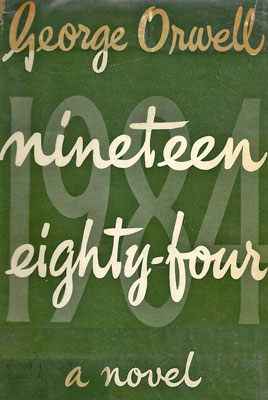
WFB:
1984 is 70. As much time has now passed since 1984 as passed between that titular year and the book’s writing. 1984 has lived a life. And Dorian Lynskey describes that life in his masterly new book The Ministry of Truth: The Biography of George Orwell’s 1984.
We now speak Orwell. Specifically, we speak in a language Orwell laid out in his seminal political horror-dystopia-romance-thriller-manifesto. (The book is a mirror of so many things Orwell disagreed with while admiring that it is not easily classified.) Written on the isle of Jura in Scotland in the last years of Orwell’s life, 1984 synthesized the ideas about human nature that had haunted the writer for his whole lifetime. “The phrases and concepts Orwell minted have become essential fixtures of political language, still potent after decades of use and misuse: Newspeak, Big Brother, the Thought Police, Room 101, the Two Minutes Hate, doublethink, unperson, memory hole, telescreen, 2 + 2 = 5, and the Ministry of Truth.” He categorized the essential evils worth fighting against as Fascism, Imperialism, and Communism. And he fought against them all quite valiantly. He even took a bullet in the fight against Fascism. Orwell also coined the term Cold War. In short, Orwell gave us the language that determined the prevailing interpretation of the 20th century.
I say we speak Orwell and not “Orwellian” because, as Christopher Hitchens was fond of pointing out, Orwell and Kafka have been done the unique disservice of having their names adjectivized into words for exactly that which they hated. Orwell is in all kinds of ways tremendously misunderstood, mostly because of 1984. “For any artist, the price of immense popularity is the guarantee that you will be misunderstood,” Lynskey writes. The great virtue of The Ministry of Truth is to provide a thoroughly enjoyable restoration of “some balance by explaining what Orwell’s book actually is, and how it has shaped the world, in its author’s absence, over the past seventy years. … Orwell’s intentions, too often distorted and ignored, are well worth revisiting if the book is to be understood as a book and not just a useful cache of memes.”
Lynskey nails it.
This biography of a thing is divided into two parts. The first details how Orwell came to write 1984. It describes his life and some of his key influences, including H.G. Wells and We author Yevgeny Zamyatin, a Soviet dissident writer whose magnum opus was a sort of blueprint for 1984, though not as close a guide as those who say Orwell plagiarized it claim. Orwell was a deeply read man of letters, both because he made a substantial chunk of his living reading and reviewing books and because he stayed constantly, almost obsessively abreast of the way literature, language, and politics were developing—driven by a prescient dread that they were heading in a totalitarian direction. This was his overarching fascination. As he said of the rise of Stalin and Hitler: “History stopped.” In the 1940s, the end of history meant the installation of dictatorial systems, not their dismantlement. MORE HERE
h/t Forcibly Deranged.

It’s here. We’re at war. The red scare was real.
He didn’t drink enough Brawndo.
So as much time has passed since 1984 as had passed from the writing of the book to 1984.
George Eric Blair Qrwell was instrumental in modernizing the English Language.
He wrote many books other than 1984, one of which is:
‘POLITICS AND THE ENGLISH LANGUAGE’
https://en.wikipedia.org/wiki/Politics_and_the_English_Language
The man was a socialist who hated what socialism inevitably turns into. He was brilliant enough to nail the outcome that when we look back from the time of Obama and Clinton and say “they must use 1984 as a blueprint,” we miss the point. He simply knew what socialists will do when they gain the absolute power they seek.
For that reason, one of these days 1984 is going to end up a banned book.
Orwell was an avowed socialist. But like some of our modern day leftists he believed it could be ‘done right’. Despite the fact the world has never seen it done right.
Interesting tidbit. I was taught he simply reversed the year ’48 (when the novel was largely taking shape) to ’84 for the year his story (warning) takes place.
We have our own Orwellian propagandist who comments right here on iotw.
It is @richtaylor
We see it as a warning, the left sees it as a guide book.
Loved the movie!
theirs a girl in it an we got to see her titties!
A former friend of mine, when asked (during the oscuma years) if he’d reread 1984 recently replied, “1984 came and went. Nothing happened!”. I think that was the final moment when I realized that we had nothing in common in terms of thought. There were many other inane insane comments over the years but that one was the last I could take.
forcibly deranged, did your former friend have the same delusion about “2001: A Space Odyssey”? 🙄
That was a double-plus good article.